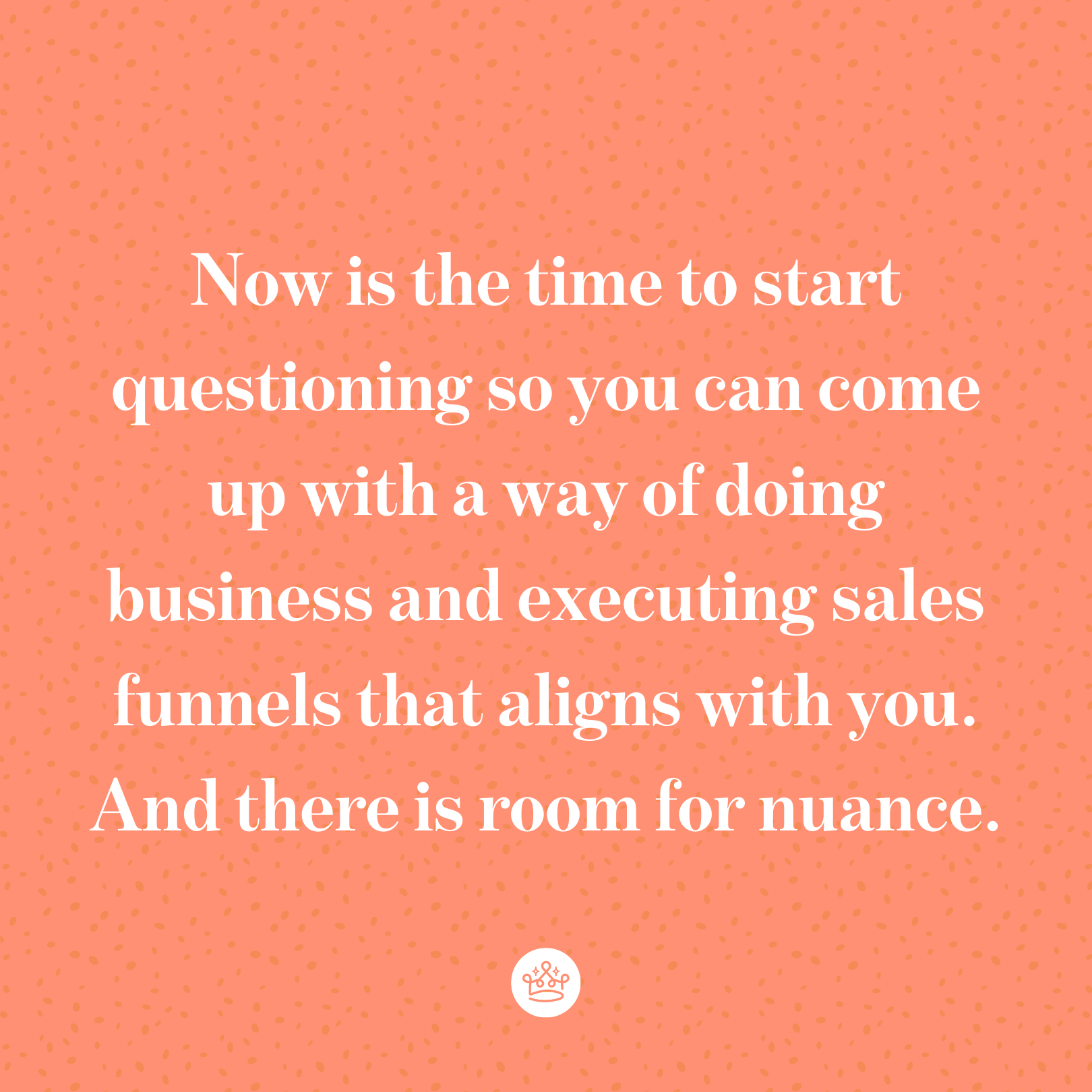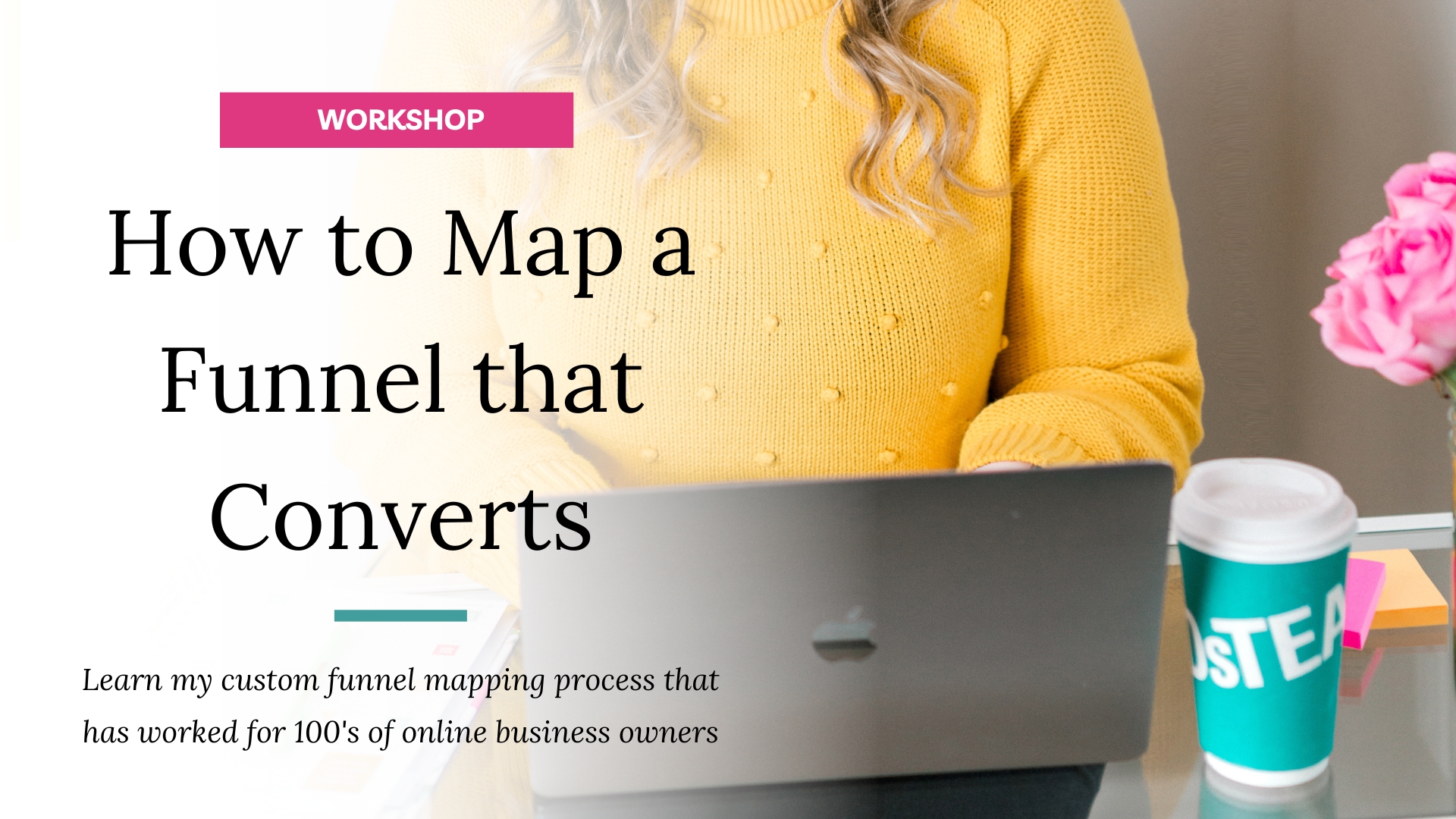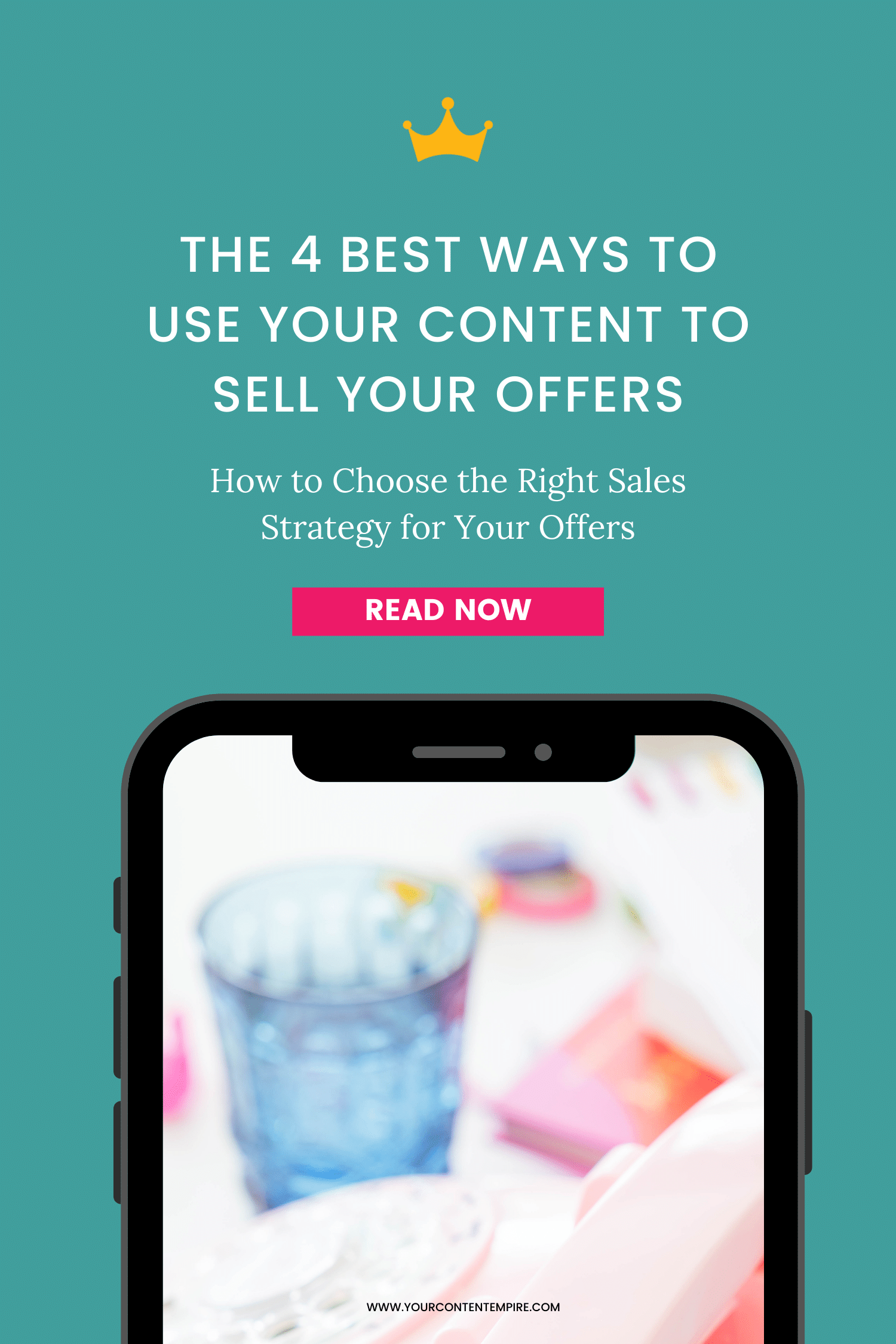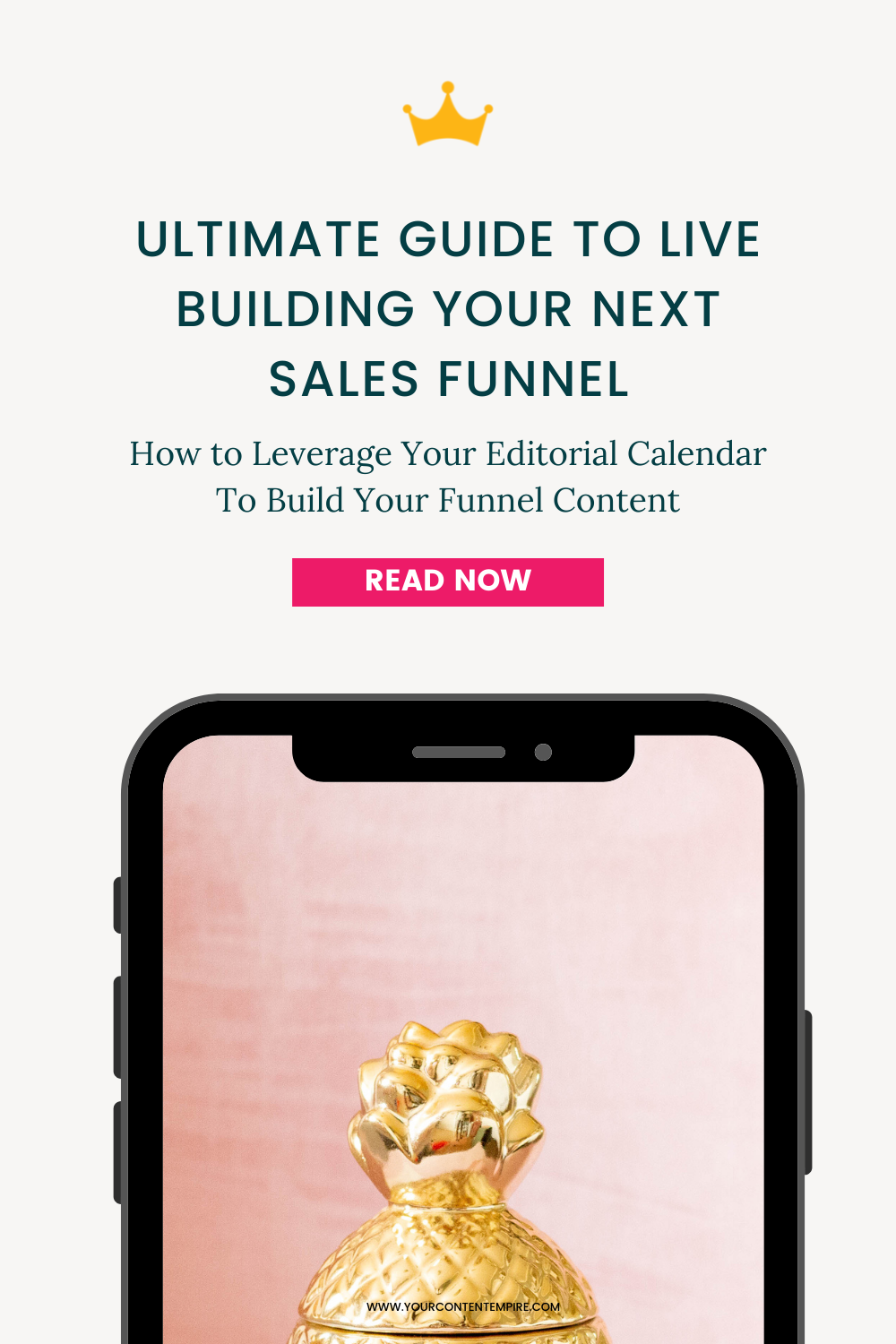Disclaimer: As someone with an agency that specializes in creating sales funnels, it felt like a responsibility to join this ethical marketing conversation. I'm well aware that I'm joining a conversation that's already being had by many.
At the end of this post, I share resources that have informed my position on this topic. You should definitely check them out if you want to learn more.
I am not claiming to have all of the answers when it comes to ethical marketing or ethical sales funnels. In fact, I think that's one of the major issues with some of the conversations being had: people implying they have all the answers as well as wrong-and-right thinking. The values that I base this perspective on (integrity, inclusiveness and creating win-wins, by the way) may differ from your own—and that’s okay. Values and ethics are individual and what may be ethical for me, may not be for you, or for someone else.
This post bookmarks where I'm at in this process of unraveling the sales funnel's role in the sketchy shit that goes on in online business and online marketing.
The Ethical Marketing Conversation
There are certain sales funnel strategies that are hugely problematic—yet they have become common practice because we don't take the time to question them. That’s what I’m diving into in this post.
Why Talk About Ethical Sales Funnels Now?
Why are we having this conversation now instead of three years ago? First, it's important to understand the life cycle of trends in online marketing. Someone has a great idea, implements it, strikes it big, and then writes those posts with headlines like “How We Made a GAZILLION Dollars In Two Days!!!”.
Early adopters then flock to implement this idea for themselves, have varying degrees of success with it, and write their own posts with headlines like, “How We Made a GAZILLION Dollars In Two Days!!!”.
Then they start selling these methods as blueprints and courses, where more people pay to learn and implement the same ideas.
The rate of return tends to gradually decline as more people start using the strategy. Naturally, people continue to buy these blueprints hoping to become the exceptions rather than the rule. It keeps trickling down until it's basically unheard of to not be using that strategy. For example—can you imagine an online business today that doesn’t use social media as part of its visibility strategy? I can think of a couple, but they’re unicorns.
This is exactly what happened with sales funnels.
The Not-So-Secret Secret of Sales Funnels
Remember that “sales funnel” is just industry lingo for “buyer’s journey” or “sales process,” which has been around since the advent of businesses that needed a way to sell their offers. And a buyer’s journey is a fundamental content marketing concept that simply helps us get the right content in front of the right people at the right time.
‘Sales funnel’ on the other hand, is a relatively new term and application of the buyer’s journey. And today (for online businesses), we generally refer to sales funnels as a free gift plus a follow-up email sequence that leads to a special offer (or some variation of the attract potential customers, sell to potential customers concept).
Since sales funnels in the online business world have been around for so long, most business owners have some kind of funnel in their business. But the not-so-secret secret of online marketing is that while most people have funnels, they rarely work. Most people don't want to admit to this because they feel like they're the only ones failing at funnels.
So we find ourselves in this culture of secrecy and shame where no one is admitting the true efficacy of how these strategies are working for them. But as people have actually started sharing their experiences with sales funnels recently, we’ve reached a tipping point—a boiling over of frustrations where more than ever we’re realizing that the claims of building a million-dollar business off the back of a $27 offer is the exception and far from the rule.
That leads us to this moment, where everything taken as standard practice in online marketing is being questioned, including sales funnels—and it's about damn time.
Issues with the Conversation around Sales Funnels
I take issue with some of the conversations that I see happening now. They seem to be more interested in shaming than questioning, and here's the thing: “When we know better, we do better,” as Maya Angelou would wisely say.
There are probably things you did back when you were just starting your business that would horrify you now… just like there are things you're doing right now that will be unthinkable later. I have people coming to me feeling really guilty over tactics that they've used in the past—things they inherited from looking at how others in the industry were doing sales funnels and launches. They didn’t take the time to question these tactics, but are obsessing over them now.
Doing the Right Thing
Now is the time to start questioning so you can come up with a way of doing business and executing sales funnels that aligns with you. It doesn't mean that recently-shamed tactics such as countdown timers or special offers as enticers for people to purchase are necessarily wrong.
There is room for nuance.
There is room for you to draw your own line on what is right for you, your sales funnel, and your way of doing business.
This post is an invitation to start questioning certain tactics and strategies for yourself. This is your opportunity to decide how you feel about them, and use those answers to form your own strategies.

Cornerstones of the Unethical Sales Funnel
Let’s start by examining what not to do when building your sales funnel and why these approaches are problematic. After being in the funnel building business for 5+ years, here are what I see as the four cornerstones of the unethical sales funnel.
Unethical Cornerstone One: Overselling Results
When building a sales funnel, we've been told to make the customer or client feel like they're getting a Ferrari for the price of a Volkswagen. Hence the list of bonuses that sometimes come with valuations, like a PDF worth a thousand dollars, or a Facebook group being deemed priceless.
But by overselling results, we put pressure on ourselves to be upping the ante all the time. We’re overselling the value of our offer when it's priced perfectly fine, just the way it is.
The same thing is true with the way we're told to “show, don't tell.” Don't get me wrong. I am a big believer in “show, don't tell” and use case studies all the time. But while testimonials and case studies can be valuable, we also want to make sure we're not overselling the typical results someone will likely get from our offers.
One of the ways to offset this and set realistic expectations is to be clear about the work involved in reaching those brag-worthy results:
- How long did it really take?
- How much time had to be invested?
- What pieces did the client or customer already have that set them up for success?
- What are potential deal-breakers that could get in the way of them succeeding?
Another thing you could do when compiling your social proof for your sales funnel is to ask yourself what your customers and clients get out of you featuring them in that testimonial. Is it tied to an affiliate program, or is there some kind of clout or cool-by-association factor at play? Ask yourself if they would have provided that testimonial without getting that perk. (Keep this in mind when you're investing in other people's offers too, and the testimonials are super persuasive.)
If you find that you're guilty of overselling the typical results that people get from your offer, rework the copy so it sets better expectations for potential customers and use it as an opportunity to improve your offer so it helps your customers get better results.
I have worked with four different instructional designers on my content mentorship program, and each time it was in response to this question: how can I better set up my students to succeed? I believe that for programs I join and services I buy, I am ultimately responsible for the results I get. There are no guarantees in business or in life.
I've learned the hard way that I can't want someone to succeed more than they do. They have to be willing to put in the work, but that's only true if it was accurately described in the marketing and fair expectations were set about what it would take to succeed.
The key thing is that it's always dishonest and unethical to market or sell your offer as something that it's not.
Unethical Cornerstone Two: Applying Excessive Pressure
The subject of applying pressure can be a bit of a grey area. It is definitely a subject where there is plenty of room for nuance. What I find to be too excessive probably differs from you, and your definition probably differs from that of someone else. I encourage you to ask questions, think critically, and draw that line of what's ethical and not for yourself.
Here are my thoughts on what's okay for me and what goes too far.
✅ Urgency and scarcity are okay even in an evergreen format, but only when done as a reward instead of a punishment.
Truthfully, except for service-based offerings, I have not yet seen an evergreen funnel work without some version of either urgency or scarcity. I think helping someone make a decision on whether something is right for them right now is a good thing. Punishments and rewards may look the same on the surface (bonuses, discounts) but it’s all in how they’re framed. For example: telling someone they’ll never ever see that price again if they don’t buy it now veers negative for me (see more below)
❌ Using ultimatums in copy goes too far.
Phrases like “last chance ever,” “you'll never have this opportunity again,” and “now or never” can be really manipulative and especially ick when it's not true.
❌ Emotional manipulation always goes too far.
I much prefer to paint a picture of what's possible without spending all my time dwelling on the pains of their current situation. I think it's fine to acknowledge the “before” and talk about it, but when persuasion copywriters tell you to twist the knife or put salt in the wounds, I am so out.
✅ Leave room for people to say no.
To those who claim you can't babysit someone else’s investment—meaning you’re not responsible for how they spend their money—I say that doesn't tell the whole story. Yes, it's likely adults that you’re selling to, but under the right conditions of excessive sales pressure, it would be hard for many of us to say no.
I'm pretty strong-willed but I remember one of my earliest business investments, I was physically shaking during the sales call, knowing that I should say no, that it wasn't right for me. But I didn’t have a clear opportunity to not have the opportunity and went forward with it anyway… and guess how that turned out.
Ever since, I have been mindfully leaving a lot of room for someone to say no and feel good about making that decision. I usually buffer my pitches with this isn't right for everyone and it might not be right for you right now.
✅ To timer or not to timer?
I actually don't care one way or another, as long as it's not paired with ultimatum copy or punishment-focused. That said, I don't use timers all that much, but they're not on my shall not ever be done list either.
Consider: What's on your okay and not okay list when it comes to urgency and scarcity in sales funnels?
Unethical Cornerstone Three: Dehumanizing Your Audience
This is the cornerstone that I see having been the most influenced by (and the biggest problem of) what’s often called “bro-marketer” culture. I don't exactly love that term either, because I think it makes us guilty of dehumanizing them at the same time and creating an us-versus-them separation, which is never helpful.
Somewhere along the way of becoming obsessed with numbers, conversion rates, opt-in rates, earnings per lead, lifetime value, we stopped seeing the person behind the email address and started viewing them only within the homogenous group of followers and email subscribers.
Don't even get me started about how problematic the literal meanings of some really common sales funnel terminology like “lead magnets” or “tripwires” can be. Hey, I love the math of sales funnels, and I use these terms as well, because they're the best way to communicate the meanings as they've become common vernacular. But I think the aim here is to always keep the human person with their own personality, fears, dreams, situations, and circumstances at the forefront.
Here are some things you can do to re-humanize your audience.
Be clear on who your offer is for and not for.
This is not as a means of exclusion, but to set realistic expectations and recognize the uniqueness of someone's situation.
Do your part.
It's not about what’s convenient. Be intentional about making your offers and content accessible by creating transcripts, subtitles, and take-on-the-go audio wherever possible. This is definitely a work-in-progress area for myself, having a really small team to execute everything we do, but it's just about being intentional and taking those steps to make it happen.
Make exceptions on a case-by-case basis.
Divest from hard rules and leave room for people to get in touch. If they need more time, other payment arrangements, a refund, if something isn't working for them or if their life situation has changed, be flexible when you can.
Step back from the numbers and appreciate the people who are there.
I've talked to a lot of people in launch debriefs who get really caught up in the numbers and hey, that's part of why I'm there—to help them break these down and figure out strategies to adjust for next time.
For example, if you don’t get as many people as you wanted signing up for your launch, don’t focus on the people who aren’t there. Show up for the people who are there, no matter how few, in the same way that you would show up with the same energy as you would if it were the number that you wanted.
Be intentional about the language that you use.
Think about the meaning, and if there are alternatives that you can use, be willing to learn. Be willing to be wrong. Be willing to question yourself and question your bias, but also be open not to have all of the answers right now, or need to be the one with all of the answers. Give yourself some time to figure it out, but be taking action and baby steps along the way to make your content more inclusive.
For example, we have a list of “no-go” words at YCE that we update regularly as we learn which terms are considered insensitive or harmful. We are open to learning where we’ve made mistakes in the past and correcting those missteps in the future.
Consider: What are some ways that you can better recognize the humanity of the individual members of your audience?
Unethical Cornerstone Four: Desperation
Desperation is at the root of the other three cornerstones of the unethical sales funnel (dehumanizing your audience, applying excessive pressure, overselling results). It could be an act of desperation if you need to make these sales so that I can pay your rent or mortgage. It could be self-imposed desperation if you tell yourself that you need to make these sales so you can hit your goals or my targets.
Either way, I have seen desperation kill a lot of really great sales funnels. I've also seen it lead people to do things that they might not otherwise do – things that aren't aligned with their values and how they would intentionally want to show up in their business.
A little disclaimer though: I am aware that my situation is different, and I am saying this from a place of privilege in that if I don't make any sales for three months or six months, I will be okay. I know that is not everyone's situation. My thoughts below aren’t necessarily applicable to everyone.
Here are some of the different ways that desperation shows up in various situations:
When you're desperate for the sale, the entire conversation reeks of that desperation and prevents you or whoever this is from tapping into confidence.
Plus, it’s hard to say yes to working with someone if you're feeling that lack of confidence. It makes you question whether or not they can do the job or not.
This is when someone might start applying excessive pressure, overselling the results, and overselling what they're capable of doing. If sales conversations make you feel uncomfortable, it could come off as desperation.
Included in the resources section below is a really good book by Matthew Pollard called The Introvert's Edge, which has helped me enormously with sales conversations and having a process around them.
Desperation also shows up in pricing.
People think that they have to have the best deal goes back to that “I'm selling a Ferrari for the price of Volkswagen” type of overselling. Anytime when someone's answer to a question like “why should I work with you?” is “Because I'm the best deal” is going to be a problem, and it leads to the cycle of my prices aren't what they should be.
It comes down to desperation to make as many sales as possible to support yourself. In reality, setting a fair price for the value of that service/product/offer would allow you to make fewer sales and reach that revenue requirement or goal in a much easier, less desperate way.
The most problematic place I see desperation in sales funnels is through funnel hacking.
This goes back to our conversation about trends. When you see people constantly looking for the next best thing, they are signing up for programs to learn someone else's method, hoping that they're going to be the ones to strike it rich.
However, they start implementing strategies without any questioning or consideration on whether it's right for their audience or aligned with their values. They're so desperate to find something that is finally going to work and make their business viable that it leads to making some really bad decisions they wouldn't make otherwise.
The problem with funnel hacking (besides the fact that there's a diminishing rate of returns) is that you’re pinning your hopes on a strategy that everyone else is using and you aren’t making it your own.
Anytime you're taking on a strategy, I encourage you to treat it as an experiment and take the time to make it your own. Put it through the filter of your values and what aligns with your business and make it customized to you.
New approaches do take time to work. There is so much customization that needs to happen when you're creating a sales funnel, that there is no one-size-fits-all blueprint that is going to work for all businesses.
The quicker that people recognize this, the quicker they're going to be able to create a sales system and a sales funnel that actually works for them.
Consider: Where in your sales system is desperation possibly showing up?
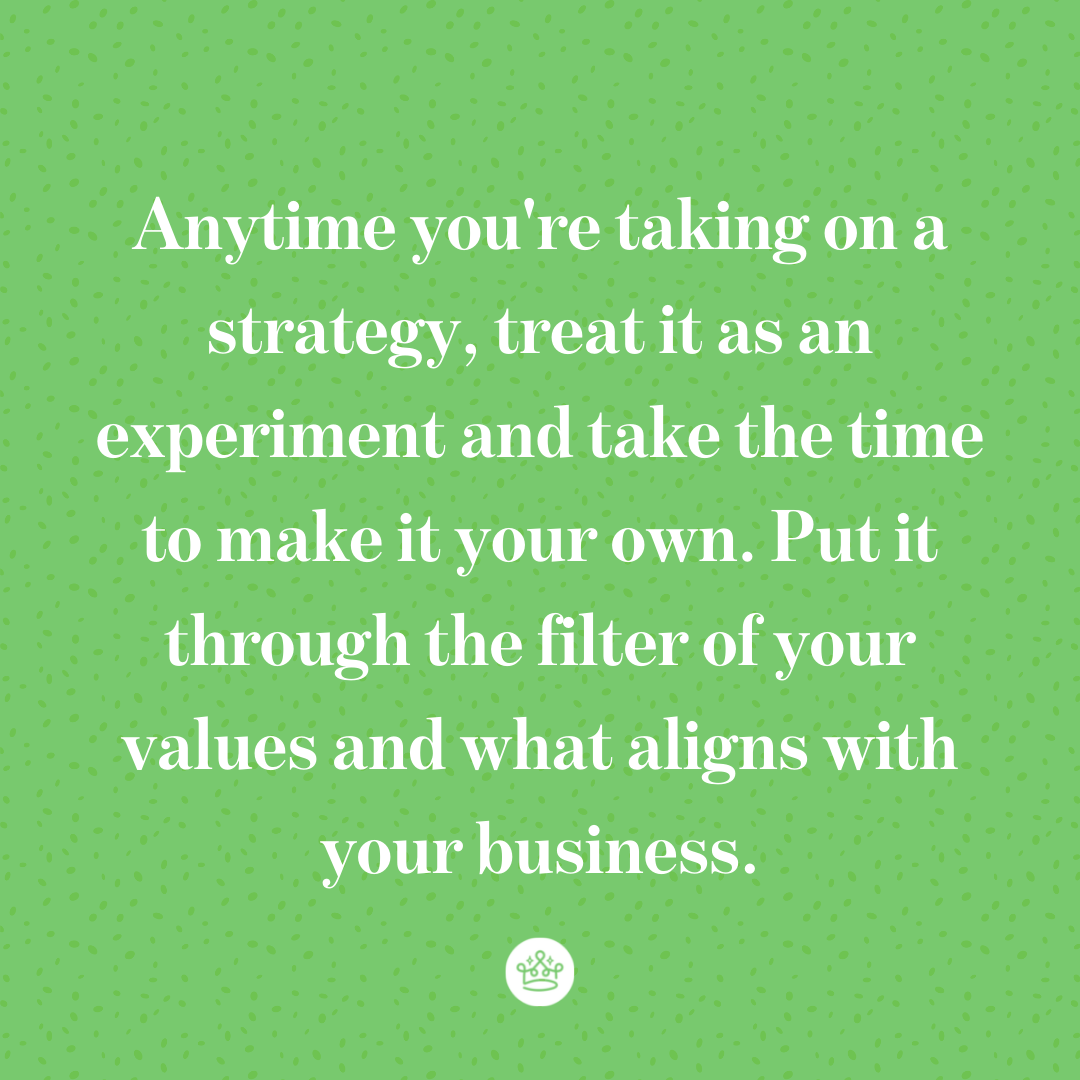
How to Approach Building an Ethical Sales Funnel
Now you know the cornerstones of an unethical sales funnel. The next step is learning how you can build an ethical one.
Why? Sales funnels are essential. There are three systems that every business needs:
- An offer system. All businesses need something to sell and a way of delivering it. It's not a business if you don't have something to sell, even if you were selling something in a totally different way from other businesses.
- A sales system. all businesses need some way of selling that offer to the right people.
- A marketing system. All businesses need some way of getting their content, their expertise, and visibility with the right people – the people who they want to be working within their business, the purchasers.
Sales Systems Are Essential
There is no way of getting around having some kind of sales system or sales funnel in your business. In my business, I actually prefer the term sales system to sales funnel. The reason is this: a sales system is your entire sales ecosystem around a particular offer, or a suite of offers from the freebie to the follow-up emails, to the point of purchase. It integrates all of these pieces and more together. So the entire experience is cohesive, consistent, intentional, and branded.
A sales funnel is just one part of your sales system (albeit an important one) that is most effective when designed with the overall sales system and vision in mind. If you have more than one offer in your business, your sales system covers all of these offers and how they interact.
My Approach to Sales Funnels
The solution to the unethical sales funnel practices isn’t to ditch your funnel—it’s to design one that aligns with your values. I build my sales system (and teach building it) in layers, so that’s how I’m going to break it down for you.
The three layers of the sales funnel are:
- freebie system
- offer system
- traffic system
This approach allows us to create a process that is a lot less overwhelming. You can build it in sections rather than needing to have the entire thing finished in order to start using it.
Ethical Freebie System
The main thing we want to do when designing an ethical freebie system is to remember the cornerstones of the unethical sales funnel. We want to make sure we're avoiding desperation, dehumanizing our audience, applying excessive pressure, and overselling results.
This also applies to the freebies that we're using to attract and validate potential clients or customers into our sales system. One of the first things that we can do is start to view our freebie as a tool to attract and validate the right person, instead of as a “get as many people as I can” type of tool.
More is not always better. Fewer leads that are of better quality will actually be more profitable and of higher service to you in your business. Also when creating your freebie, consider how you can make it more accessible. Where can you bring in elements such as transcripts and subtitles? Where can you make it more accessible to people? Design your freebie with that in mind.
If on the thank-you page for your freebie you decide to use some kind of special offer, consider the language you're using on that page. Don't say they're never going to get this special again if it's going to show up every time they sign up for the freebie. Don't oversell the results of that special offer. Make sure you present realistic expectations.
Ethical Offer System
First and foremost, make sure that you're presenting and pricing your offer realistically. We want to make sure we're setting realistic expectations of what people are going to need in order to succeed with this offer.
Don't price it to be the best deal in town, because you never want to be competing on price. Not only is that going to lead to presenting your offer in a desperate light, but it also falls into this overselling the results category as well.
I encourage people to raise their rates so they can focus on fewer, higher-quality leads in order to hit the goals that they need to be.
Another important practice to keep in mind has to do with your follow-up email sequence. In this sequence, be sure to give people an out. Make it okay for people to say no if it isn't for them. I recommend running your email sequence through the TARES Test, which is from Sherry Baker and David Martinson. They call it ethical persuasion, and there is a five-point test that you can run your copy through.
The main things that you want to check for are:
- Truthfulness. So is this factually accurate?
- Authenticity. Is this aligned with your integrity and your values?
- Respect. Are you respecting the humanness of the other person, the person on the other side reading this?
- Equity. Do people know that they are being sold to rather than just informed?
- Social responsibility. Have you unfairly stereotyped others? What language have you used? How have you presented it? Is it inclusive?
I’ve included a link to the TARES test in the resources section.
Ethical Traffic System
When it comes to traffic systems for your sales funnel, the main ethical grey area is social media and paid advertising.
But as much as people write off particular platforms as more ethical or less ethical than others, there is so much room for nuance and it comes down to how you use them. For instance, I’ve seen many conversations writing off Facebook ads as unethical, but if you’ve watched the frightening documentary The Social Dilemma on Netflix, all social media platforms are inherently designed to manipulate us into using them more and influence our behaviours.
My stance is this: We get to choose how we use any of these tools (including social media) and draw our own lines on what’s ethical and not. If you decide that platform is unethical, don’t use it.
The main way that you can design your traffic system more ethically is to always recognize the humanness of the people and the audience that you want to attract. Keep that in mind when you're putting together your content and your marketing, aim to connect with people on a human-to-human level.
Not only is that going to make you more connected and more in tune with the people that you want to be helping, but it's also going to help your marketing be more effective. Don't get so caught up in the numbers that you forget about the people.
Helpful Resources
A non-exhaustive list of resources that I’ve found helpful and will update as I come across additional resources.
✅ Small Business Boss – So much of what I’ve learned about ethics in online business has been from conversations that Maggie has been having for years. There are so many episodes of her podcast that you could learn a ton from (and heck, follow her on Instagram like yesterday) but here are a couple I consider staples: Taking a New Approach to Marketing and Sales for Your Online Business || The Antidote to Fear-Based Marketing & Sales
✅ The Content Witches – When it comes to creating content that’s inclusive, Nailah’s resources are some that I use and recommend. You can find her Inclusive Language Cheat Sheet here to get started.
✅ MableyQ – I’ve learned so much from Accessibility Made Easy, a course from Erin Perkins that breaks down exactly what to do to start making your content more accessible without getting overwhelmed in the process.
✅ Better Marketing (Medium) – I found this article from Steve Genco really helpful for breaking down exactly where persuasive copywriting crosses the line into manipulation.
✅ The TARES Test – If you want to go straight to the source, here’s the paper by Sherry Baker and David L. Martinson where they go over the five principles of ethical persuasion.
✅ Going Ultraviolet – I really love Kristen’s perspective on selling without (as she puts it) making your customers feel like sh*t. In fact, I originally came across the TARES Test during my master’s studies but finding a resource that wasn’t an academic journal for explaining it wasn’t the easiest, so I really appreciate her blog post here – Meet the Tares Test.
What’s next for your sales funnel?
There’s no shame in working on improving the ethics of your sales funnel—most of us still have some work to do. Figuring out where your funnel could be improved is the first step, and then you can move onto the steps of building an ethical one through your freebie, offer, and traffic systems.
Remember that unethical sales funnels are built on four cornerstones: overselling results, applying excessive pressure, dehumanizing your audience, and desperation. Be aware of whether you’re falling into these methods and “when you know better, do better” (thank you, Maya Angelou).
It’s important that you remember that in many cases there is room for nuance, and often it will come down to your values and what you are comfortable with. Be prepared to draw your own line, and when you do be prepared to stick to it.
